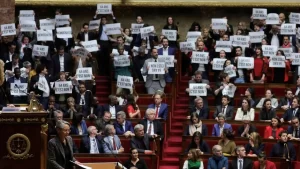We are posting this article by David Kellaway of anti-capitalist resistance. It describes well the growing working class resistance to Macron’s proposed pension counter-reforms. It is followed by a statement from the Fourth International affiliated New Anti-capitalist Party (NPA). In a comment at the end, EL&SD EB member, Allan Armstrong makes some additional points about the article’s title and the nature of the French state.
ARE YOU WATCHING MISTER STARMER, THIS IS WHAT OPPOSITION LOOKS LIKE
The crisis in France over Macron’s attempt to force people to work another two years before they can take a state pension took a new, dramatic turn on the 16th March. Macron wanted to do a deal with the mainstream conservative party, the Republicans (LR), but given the huge mobilisation in the country against his “reform,” these MPs failed to support the president. So he resorted to the undemocratic but constitutional mechanism of the 49.3 clause to push through his policy without a parliamentary majority.
Élisabeth Borne had to abandon her first attempt to deliver this decision as the NUPES (New Ecological and Social Peoples Union) opposition in parliament stood up with placards and sang the Marseillaise, the French national anthem.
At the same time, workers were gathering in the Place de la Concorde, which faces the National Assembly across the Seine. Police data said there were over 6000 who were joined by Mélenchon (leader of La France Insoumise, LFI, and France Unbowed) and other NUPE leaders. The left-leaning parliamentary opposition has joined in on the half-dozen previous strike and demonstration days. What a contrast with Starmer’s opposition, which bans front bench spokespeople from going anywhere near a picket line or demonstration!
Rolling strikes were already underway in some key sectors of the economy, like the rail, air traffic, and energy sectors, where union organisation is strong. Refuse workers have been taking action in Paris with the rubbish piling up. Workers in Le Havre blocked roundabouts, preventing access to the big industrial zone in the town. Some cars were burned, and barricades were built. Flames arose against the Parisian sky. Police used tear gas and water cannons to clear the protesters, and many were arrested. A meeting of the coordinating committee, involving eight trade union confederations along with student and school student organisations took place on Thursday night and has called for another national day of strikes and demonstrations for the 23rd of March.
Mélenchon has announced that NUPES will support a motion of censure being put forward by an independent parliamentary group (the LIOT). Marine le Pen’s hard-right party, the National Rally (RN), will likely also support it. However, Ciotti, the leader of the more mainstream conservatives, the Republicans (LR), has said his group will not support the vote of no confidence. So the numbers at the moment — about 20 or so — look like they will not be enough to get it passed. The LR fears that it will lose out electorally if there were to be a dissolution of parliament and new elections—the normal consequence of a vote of no confidence passing. Elections now would probably help NUPES increase their vote, with even the possibility of Mélenchon’s election slogan from last year’s parliamentary elections, “Put me in the Matignon (= Downing Street), actually becoming a reality.
Subsequently, it reinforces a widespread sentiment that parliament can no longer do much and that Macron has to be stopped by the strength of industrial action and street demonstrations. The left wing of the movement is doing everything it can to encourage moves toward an all-out general strike.
Some NUPES MPs are going to the Constitutional Council to try to get the reform ruled unconstitutional, and they will also propose that the people vote on the reform in a referendum. It would block implementation for nine months and also require collecting over 4 million signatures. Other LFI MPs think that the reform can be killed off before then through continued and heightened mobilisation.
Big public meetings are being planned too, which will involve all currents of the movement. This Sunday there is one in Paris with speakers from the LFI, the more moderate Socialist Party, and the New Anticapitalist Party. This does not happen very often.
Opinion polls still show around 70% against Macron, so there is a real crisis of legitimacy for the regime. The mobilisation is very broad, involving trade unionists, students, young people, the Yellow Vests, and the whole broad left, but mobilising people beyond the traditional labour movement. There really is a good chance of it continuing to defeat Macron.
Victory is possible against Macron, his reform and his 49.3 (Statement from the NPA)
The use of the Article 49, Paragraph 3 of the French constitution1 by the government is a democratic scandal. It shows the weakness of the government’s social base and of its authoritarian approach. Under the pressure of the movement, despite an agreement with the LR (Republicans: mainstream conservatives) leadership, their members of parliament did not dare vote for the reform. It reinforces the illegitimacy of the government and pushes the mainstream left and union leaderships with positions in the institutions to continue the mobilisation, notably the CFDT2. It shows the particularly undemocratic character of the institutions of the Fifth Republic, which allow a minority government to pass a reform. In a way, what has happened is good news for the movement.
The actions that took place throughout the country on Thursday night testify to the anger at the democratic scandal, the repression that has been unleashed, not only against the demonstrations but also against specifically targeted union activists, such as those in the energy sector, and the hardening of the government’s position. Macron and his reform have little support, and the first post – 49.3 percent opinion poll indicates the massive rejection of his draconian action and the depth of the protest, which is not weakening. With the continuation of the mobilisation, it is likely that the government will step up the repression. This will require solidarity and a united response equal to the challenge.
However, nothing is won. The motions of censure will be rejected, and the balance of forces remains uncertain. The movement must take a step forward to win; we can no longer be satisfied with renewable, rolling strikes. The 23rd of March date set for the next national mobilisation announced by the inter-union coordination3 is too far away. We have to use it to build strikes where there are none by building on the strength of the mobilised sectors. But we need to accelerate the pace so as not to demoralise people and not to leave the most advanced sections of the labour movement isolated.
For us, a victory depends on the combination of different factors:
- Strengthening the rolling strikes, in particular in the public services and state enterprises. In the private sector, it is necessary to broaden the mobilisation to slow down production and put pressure on the employers and their political representatives. Renewable strikes have greatly contributed to destabilising the government. We have to do everything to enlarge them; to make this struggle a daily mobilisation, the movement has to be in the news every day. What we are aiming for is a general strike.
- Continuing the mass demonstrations which show the depth of the movement and its legitimacy. We call for mobilisations everywhere that directly target political power, as the Yellow Vest movement did. The movement must aim to blockade the country. We need a national demonstration in Paris to politically and massively challenge Macron’s reforms and government.
- Responding to the ongoing democratic scandal The government and Macron must go, but we must prevent the far right from ambushing us and gaining the main benefit. It is a question of imposing a policy that starts with the needs of workers, youth, and pensioners and relies on their mobilisations to impose it. We need a government that is as faithful to the interests of workers as Macron’s is to those of the employers. It is the responsibility of all the organisations of the trade union, political, and social movements on the left to discuss all these points. We will work to help set up such meetings as soon as possible.
Beyond that, and more than ever, a political alternative around a project of breaking with capitalist policies is necessary—a rupture for an ecosocialist society.
17.3.23
Footnotes
[1] Paragraph 3 of Article 49 of the French constitution allows the prime minister, “after deliberation by the Council of Ministers,” to force a bill through the Assemblée Nationale with no vote. The only alternative to prevent the bill from passing is then to overthrow the government. When the prime minister triggers this procedure, MPs have the option of tabling a motion of no confidence within 24 hours. (Le Monde https://www.lemonde.fr/en/france/article/2022/10/19/france-how-does-article-49-3-allow-a-bill-to-be-passed-without-a-vote_6001019_7.html.)
[2] The largest French trade union confederation by number of members (875,000) but historically less radical than the CP-dominated CGT to which it comes second in voting results for representative bodies.
[3] The inter-union coordination is composed of eight trade-union confederations/federations (CGT, CFDT, FO, CFTC, CFE-CGC, UNSA, Solidaires and FSU.) and four youth organisations l’Union nationale des étudiants de France (Unef), l’Union nationale lycéenne (UNL), le Syndicat général des lycéens (SGL), and the Fédération indépendante et démocratique lycéenne (FIDL).
______________
Comment by Allan Armstrong
The “Are you watching Mister Starmer, this is what opposition looks like” title of this article is rather ambiguous. It might suggest that Sir Keir Starmer could learn a lesson from the French working class and back strike action in the UK. But it’s not as though Starmer might think, “Oh, wait a minute, this is a much better way to oppose the Tory government, I must try that!” Starmer opposes the working class taking any independent initiative as much as Sunak or Macron.
The mention of Starmer, though, could perhaps reflect a Labour Party orientation by the author, suggesting that this is how we can win back the Labour Party. But the problem with this Left social democratic approach is shown in the article.
Labour/Social Democracy believes it can use the existing state to bring about its reforms. But Macron’s resort to the French constitution’s highly undemocratic 49, paragraph 3 highlights the anti-democratic nature of the French presidential imperial republic. As with the UK state’s Crown Powers, a whole number of democratic rights can be suspended in an “emergency”. These can then be enforced by the particularly brutal CRS. Even if the Macron government was replaced by the Left social democrat, Melechon and his allies – a big if – it would have to work within this repressive state’s framework, with key sections lying beyond any parliamentary accountability and quite prepared to resort to the Far Right.
In the UK, even if many still think as subjects, and become passive before all the royal trappings and union jack waving, fewer on the Left are swayed by this, although many still avoid any overt challenge. But in France with its one-state, one-nation Jacobin legacy, further reinforced by Napoleonic imperial bureaucratic centralism, even militant citizens waving the tricoleur and singing La Marseillaise, can soon fall in behind the existing state.
Thus, whilst it is indeed important to unite and strengthen working class action, as Left social democrats urge, for Socialist Republicans it is even more important to openly challenge the French presidential imperial Fifth Republic and call for a Sixth Republic. Sovereignty should lie with the people And in a state where racism is now promoted everyday by the state and the Far Right, the choice of citizenship should be is opened up to migrants after 6 months.
__________
also see:



